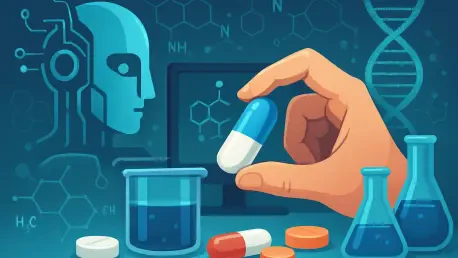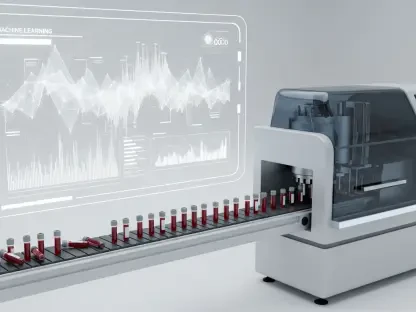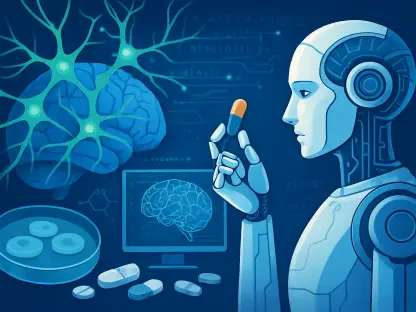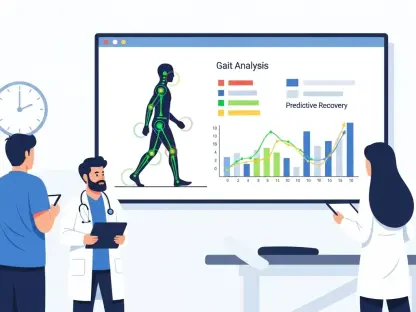The pharmaceutical industry stands at a critical crossroads, grappling with the staggering statistic that developing a single new drug can cost upwards of $2.6 billion and take over a decade from discovery to market, pushing the sector to seek groundbreaking solutions. Artificial Intelligence (AI) has emerged as a transformative force, promising to streamline processes, reduce expenses, and unlock new possibilities in drug development, offering a glimpse into a future where innovation is faster and more accessible. This review delves into the capabilities of AI within the pharmaceutical landscape, examining its features, performance, and potential to reshape healthcare.
Core Features of AI in Pharmaceuticals
AI in the pharmaceutical sector leverages advanced technologies such as machine learning, data analytics, and predictive modeling to address complex challenges. Machine learning algorithms can sift through vast datasets to identify patterns and correlations that human researchers might overlook, enabling quicker identification of promising drug candidates. Predictive modeling, on the other hand, forecasts outcomes like drug efficacy or potential side effects, providing a virtual testing ground before costly lab experiments begin.
Beyond raw data processing, AI incorporates natural language processing to mine scientific literature and patents, extracting valuable insights from unstructured text. This capability accelerates the early stages of research by summarizing decades of studies in mere hours. Additionally, deep learning models simulate biological interactions at a molecular level, offering a detailed understanding of how drugs might behave in the human body, thus refining the design process.
The adaptability of AI systems allows integration into various pharmaceutical workflows, from discovery to manufacturing. These tools can be customized to tackle specific issues, such as optimizing supply chain logistics or enhancing quality control in production. This versatility positions AI as a multifaceted solution, capable of evolving alongside industry needs and technological advancements.
Performance Analysis of AI Applications
AI in Drug Discovery and Development
In drug discovery, AI has demonstrated remarkable efficiency by slashing the time required to identify viable compounds. By analyzing chemical libraries and biological data, AI platforms can predict drug-target interactions with high accuracy, often reducing the initial screening phase from years to months. This speed translates into significant cost savings, allowing companies to allocate resources more effectively.
Moreover, AI excels in optimizing lead candidates through iterative simulations, minimizing the risk of late-stage failures. For complex diseases like cancer or neurodegenerative disorders, where traditional methods struggle, AI-driven approaches have unearthed novel therapeutic pathways. The technology’s ability to handle multidimensional data sets it apart as a critical tool for tackling unmet medical needs.
Performance metrics further underscore AI’s impact, with some studies reporting a reduction in drug development costs by up to 30%. While not a complete replacement for human expertise, AI acts as a powerful ally, enhancing decision-making and prioritizing the most promising research directions. Its growing adoption by major biopharma firms signals a shift toward data-driven innovation as a standard practice.
AI in Clinical Trials and Data Management
Clinical trials, often a bottleneck in drug development, benefit immensely from AI’s capacity to streamline processes. AI algorithms improve trial design by identifying suitable patient cohorts and predicting recruitment challenges, ensuring studies start on a strong footing. Real-time data analysis during trials also enables adaptive designs, where protocols can be adjusted based on emerging results without compromising integrity.
The use of predictive analytics in assessing trial success rates has proven invaluable, allowing researchers to anticipate outcomes and mitigate risks early. This foresight reduces the likelihood of costly delays or cancellations, a common issue in traditional trial setups. AI’s role in managing and interpreting vast amounts of clinical data further enhances efficiency, providing actionable insights at unprecedented speeds.
Notably, AI facilitates patient-centric approaches by matching individuals to trials based on genetic profiles or medical histories, improving outcomes and engagement. This precision not only boosts trial efficacy but also aligns with the broader trend of personalized medicine. As a result, AI is redefining how clinical research is conducted, making it more agile and responsive to real-world needs.
Recent Advancements and Industry Adoption
Recent strides in AI technology have amplified its relevance in pharmaceuticals, particularly through advancements in deep learning for drug design. These sophisticated models can generate novel molecular structures tailored to specific therapeutic targets, pushing the boundaries of what is chemically possible. Such innovations are paving the way for faster identification of breakthrough treatments.
Another notable trend is the rise of AI-driven personalized medicine, where treatments are customized to individual patient profiles using genetic and lifestyle data. Partnerships between tech giants and pharmaceutical companies have accelerated this shift, combining computational expertise with clinical knowledge. These collaborations are fostering a culture of innovation, with joint ventures becoming a cornerstone of modern drug development.
Industry behavior reflects a growing acceptance of AI as an indispensable tool, with many firms integrating it into core operations. From startups to established players, the focus has shifted toward building AI capabilities in-house or through strategic alliances. This widespread adoption, evident in the increasing number of AI-based projects in recent years, highlights a transformative era for pharmaceutical research and production.
Real-World Impact and Case Studies
AI’s practical impact is evident across diverse pharmaceutical sectors, notably in optimizing supply chain logistics. By predicting demand fluctuations and identifying bottlenecks, AI ensures a steady flow of raw materials and finished products, minimizing disruptions. This application is particularly vital in maintaining resilience amid global uncertainties.
Specific implementations by major biopharma companies showcase AI’s potential, such as platforms used for drug repurposing. These systems analyze existing medications to uncover new therapeutic uses, significantly cutting development timelines for rare disease treatments. Such successes illustrate how AI can breathe new life into stalled or underutilized research areas.
Unique use cases further highlight AI’s versatility, including predictive maintenance for manufacturing equipment. By anticipating machinery failures before they occur, AI reduces downtime and ensures consistent production quality. These real-world examples collectively demonstrate that AI is not just a theoretical concept but a tangible driver of operational excellence in the industry.
Challenges and Barriers to Implementation
Despite its promise, AI in pharmaceuticals faces significant hurdles, particularly around data privacy and security. The sensitive nature of patient and research data necessitates stringent safeguards, as breaches could undermine trust and compliance. Balancing innovation with ethical data handling remains a pressing concern for stakeholders.
Regulatory challenges also pose barriers, as frameworks struggle to keep pace with AI’s rapid evolution. Ensuring that AI-driven solutions meet safety and efficacy standards requires robust validation processes, often slowing adoption. Additionally, the lack of high-quality, diverse datasets to train models can lead to biases, limiting the technology’s effectiveness across varied populations.
Efforts to address these issues are underway, with collaborations focusing on standardized data protocols and transparent AI methodologies. Industry leaders are also engaging with regulators to shape policies that support innovation while maintaining accountability. Overcoming these obstacles is essential to unlocking AI’s full potential in transforming pharmaceutical practices.
Future Potential and Integration
Looking ahead, AI holds the promise of revolutionizing precision medicine by tailoring therapies to individual genetic makeups with unprecedented accuracy. Fully automated drug development pipelines, where AI oversees everything from discovery to trial design, could become a reality within the next few years. Such advancements would drastically reduce human intervention and accelerate therapeutic breakthroughs.
The long-term impact of AI could extend to addressing healthcare disparities by enabling affordable drug development and distribution models. By optimizing resources, AI has the potential to make life-saving treatments accessible in underserved regions. This vision aligns with global health goals, positioning AI as a catalyst for equitable medical progress.
Integration with other emerging technologies, such as blockchain for secure data sharing or robotics for automated manufacturing, could further amplify AI’s influence. These synergies might create a seamless ecosystem where innovation, efficiency, and trust coexist. Exploring these intersections will be crucial for the pharmaceutical industry to stay ahead in a rapidly evolving technological landscape.
Final Thoughts and Next Steps
Reflecting on this evaluation, AI has proven to be a game-changer in the pharmaceutical realm, redefining efficiency in drug discovery, clinical trials, and manufacturing. Its ability to process vast datasets and predict outcomes with precision marks a significant leap forward for an industry burdened by time and cost constraints. The real-world applications and industry adoption highlighted during this review underscore AI’s tangible contributions to healthcare innovation.
Moving forward, stakeholders should prioritize building robust data governance frameworks to address privacy and bias concerns, ensuring trust in AI systems. Investment in cross-sector partnerships between tech and pharma entities will be vital to harness complementary expertise and drive scalable solutions. Additionally, advocating for adaptive regulatory policies that evolve with AI advancements can help sustain momentum without compromising safety.
As a next step, the industry must focus on pilot programs that test AI integration with emerging tools like robotics, setting the stage for a more automated and interconnected future. Encouraging knowledge-sharing platforms where successes and challenges are openly discussed will foster a collaborative spirit. These actionable measures can solidify AI’s role as a cornerstone of pharmaceutical progress, paving the way for healthier outcomes worldwide.









